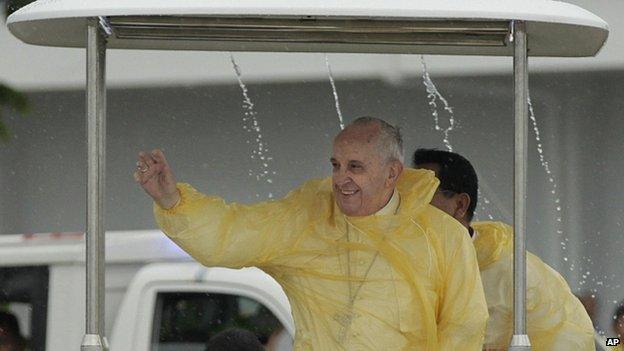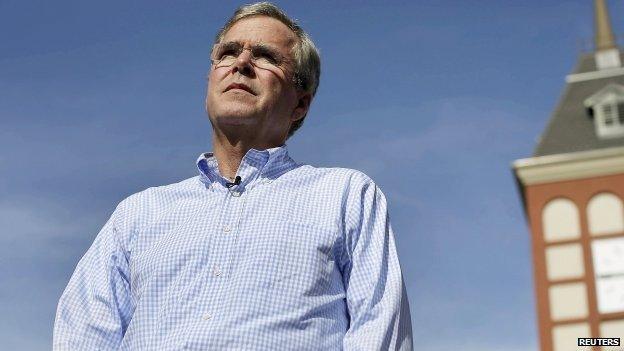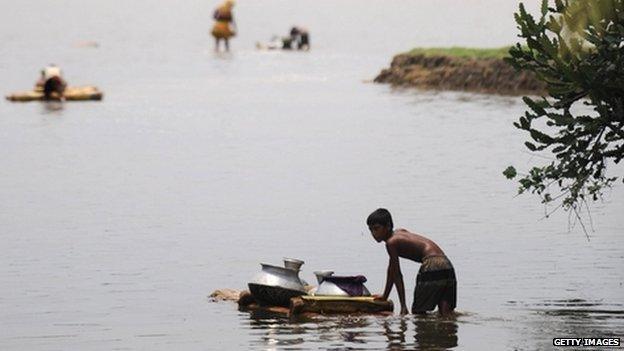Pope aims for action on climate change
- Published

Pope Francis experienced extreme weather when he visited Tacloban
Unusually for Papal teaching, this encyclical is not just addressed to Roman Catholics but to everyone on Earth: calling on all humans to help save the planet that the Pope says we are in danger of destroying.
Pope Francis wants to influence the debate on the environment ahead of a UN summit on climate change later this year - more evidence of a pontiff determined to act as a catalyst for change, and a powerful diplomatic player on the world stage, shown in the Vatican's work in bringing Cuba and the US together.
Already, though, the leaked document has received a frosty response from sceptical conservatives/Republicans in the US - including two Roman Catholic presidential candidates.
One, Jeb Bush, said he didn't get his economic policy from his bishops, cardinals or pope - so why his policy on the environment, external?
Rick Santorum also questioned , externalwhether the Pope was credible on the issue of climate science.
However, while climate change sceptics in the US have already been critical, even before the document's release, many environmentalists have welcomed the Pope's plan to make a stand on the issue.
Liberal support
It is also likely to please many Catholic liberals, who say it should spur many in the wealthiest lands to do more to help the poorest.
"This will be fundamental," says Neil Thorns, director of advocacy at Cafod (the official overseas development and relief agency of the Catholic Church in England and Wales.)
"The Pope has always sided with the poor. We all know in the rich world that we have caused this environmental problem.

Jeb Bush has been critical of the Pope's encyclical
"He is encouraging us all to do a number of things: to look at our lifestyles, the way we live our life.
"The Pope is also encouraging businesses to look at how they operate, and say to themselves, 'Are we operating for the common good or just for profit?'"
So what does the Pope say on climate change, in his long-awaited document?
It is named Laudato Si or praise be to you, from the Canticle of the Creatures by St Francis, the patron saint of animals and the environment, whose name Jorge Bergoglio took when he became Pope.
His namesake's care of every creature - and regard for even the birds as his brothers and sisters - features as an example to follow in this encyclical "on the care of the common home".
Dramatic language
Using sometimes dramatic language about the Earth, the Pope writes that: "We have come to see ourselves as her lords and masters, entitled to plunder her at will.
"The violence present in our hearts, wounded by sin, is also reflected in the symptoms of sickness evident in the soil, in the water, in the air and in all forms of life."
The questions the Pope puts at the heart of the document are: "What kind of world do we want to leave to those who come after us, to children who are now growing up?" and the moral and existential question: "What is the purpose of our life in this world? What is the goal of our work and all our efforts? What need does the earth have of us?"
Pope Francis believes that unless mankind struggles with the deeper issues, human concern for ecology will not produce any significant results.

The Pope believes we can do more to prevent climate change
His encyclical backs scientists who say global warming is mostly man-made, and says that developed countries have a particular responsibility to stop creating the damage to the Earth and its climate that will hurt the poor the most.
It was a theme he enlarged on at his weekly general audience.
"This home of ours is being ruined and that damages everyone, especially the poor," he said.
"Mine is an appeal for responsibility... I ask everyone to receive this document with an open spirit."
The letter comes in a week when Italy has become all too aware of the many migrants coming by boat from Africa, to seek a new life in Europe, a trend that some say is only likely to be exacerbated as the Earth warms.
The Pope, however, thinks that it is not too late for mankind to change its ways: "Humanity still has the ability to work together in building our common home.
"Human beings, while capable of the worst, are also capable of rising above themselves, choosing again what is good, and making a new start."
Self-centred humanity
The encyclical is divided into six chapters, starting with a review of the current situation based on scientific findings, followed by a look at Judeo-Christian tradition, with the root of the problems analysed as being due to excessive "human self-centeredness".
Pope Francis is keen to initiate a dialogue at every level of social, economic and political life, one that works on all levels: from the educational, to the spiritual, political and theological.

Themes of the encyclical:
The intimate relationship between the poor and the fragility of the planet
The conviction that everything in the world is connected
The critique of new paradigms and forms of power derived from technology
The call to seek other ways of understanding the economy and progress
The value proper to each creature
The human meaning of ecology
The need for forthright and honest debate
The serious responsibility of international and local policies
The throwaway culture and the proposal of a new lifestyle

The Pope also states that "access to safe drinkable water is a basic and universal human right", and that the plants and animal species that are disappearing have a value in and of themselves.
And on the economy, he makes clear his distaste for consumerism and waste, saying that "by itself the market cannot guarantee integral human development and social inclusion".
Above all, he makes clear that humans have become too self-centred, "focused exclusively on themselves and on their own power".
This results in a "use and throw away" logic that justifies waste, environmental or human.
It is typical of this Pope that he should choose as his first major teaching not abstract theology, but an attempt to change something so fundamental to the future of all humanity and what he sees as all God's creation.
Whether he can help move the Earth's political and business leaders to act more quickly or persuade them to ask voters to change their first-world lifestyles is another matter.